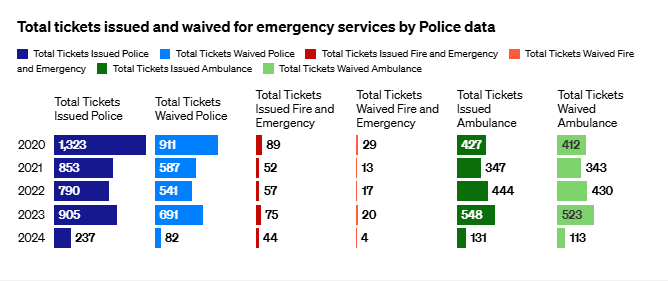Emergency services drivers had to pay up on a quarter of the speeding fines they've been issued in the past five years.
Official Information Act responses from both police and NZTA showed that over the past five years, 6335 infringements had been issued in total to emergency services vehicles with 4729 of those infringements waived (75 percent).
From 2020-2024, police issued 162 speeding infringements to police in Canterbury, with 86 of them waived. Over the same period in Canterbury, police issued 28 speeding fines to Fire and Emergency NZ and waived three, while ambulance services received 61 speeding tickets, with 58 waived.
Police have been issuing infringement notices since 2014 for emergency services vehicles detected exceeding the speed limit by more than 30km/h. The tickets are waived if a vehicle is responding to an emergency.
The infringements, which were recorded from both fixed and mobile speed cameras, were predominately recorded by police, with NZTA recording a small number as cameras were handed over last year.
Between 2020-2024, police were the emergency service with the highest number of speeding infringements coming in at a total of 4118, of which 68 percent were waived.
Ambulance services (both St John and Wellington Free Ambulance) came in second with 1897 infringements. They had a much higher percentage of tickets waived, coming in at 96 percent.
Fire and Emergency had a much lower number of infringements with just 318 tickets issued, but the number of tickets waived was also significantly lower with just over a quarter (26 percent).
NZTA also issued two infringement notices for Rescue Helicopter vehicles - both of which were waived.
Police data shows by police district, the highest number of infringements recorded were in the Waitematā district (1172 infringements for police, 56 for fire and emergency, and 542 for ambulance).
Meanwhile Tasman was the district with the lowest number of infringements (34 infringements for police, six for fire and emergency, and eight for ambulance services).
 Credit: RNZ
Change to the rules
Credit: RNZ
Change to the rules

In late 2023 police stopped issuing infringement notices if a vehicle's emergency lights were activated, as it was presumed in those cases that a legal exemption or defence applied.
Vehicles without emergency lights flashing travelling at any speed above the speed limit continued to be issued an infringement notice.
Correspondingly, in 2024 infringements took a steep dive as a result, as did the number of infringements waived.
Between 2020-2023 the number of infringements waived averaged between 70 and 80 percent, while in 2024 that dropped to 44 percent.
Police said notices were sent to the relevant agency to identify the driver of the vehicle who was then required to either pay the notice or submit a valid defence.
How agencies respond to infringements
For each agency, when a fine was not waived it was down to the driver to pay for it.
Police inspector Peter McKennie said police staff were individually responsible for their driving offences, and were not obligated to provide an explanation unless they choose to submit a request for the notice to be waived.
"In most cases where notices are not waived, it is because no submission was received to provide evidence that the vehicle was being used in a way that qualifies for an exemption under the law," he said.
Fire and Emergency said it would apply for a waiver if a vehicle was responding to an emergency with its emergency lights on.
"If the vehicle was not responding to an emergency, then a waiver is not applied for."
St John said the small proportion infringements not waived for its agency generally related to human error or situations where the speed driven could not be justified as part of an emergency response.
"A situation where a fine might not be waived could include if a staff member was driving an ambulance outside of an emergency response, such as travelling back to a station, or where the level of urgency did not justify exceeding the speed limit," general manager of Ambulance Operations - Emergency Ambulance Service South Rosanne Shaw said.
Wellington Free Ambulance similarly said the small number of fines that were not waived were typically down to human error.
"These situations could include a staff member travelling back to station, transporting a patient where the level of urgency did not justify exceeding the speed limit as examples," a spokesperson said.














